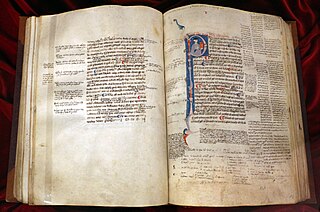Ampliative (from Latin ampliare, "to enlarge"), a term used mainly in logic, meaning "extending" or "adding to that which is already known". [1]
This terminology was often used by medieval logicians in the analyses of the temporal content of their subject terms. [2] There were three rules outlined in its usage:
There are Roman texts that refer to it as ampliatio. [3]
In Norman law, an ampliation was a postponement of a sentence in order to obtain further evidence. [1]
In grammar, tense is a category that expresses time reference. Tenses are usually manifested by the use of specific forms of verbs, particularly in their conjugation patterns.
In linguistics, aspect is a grammatical category that expresses how an action, event, or state, as denoted by a verb, extends over time. Perfective aspect is used in referring to an event conceived as bounded and unitary, without reference to any flow of time during. Imperfective aspect is used for situations conceived as existing continuously or repetitively as time flows.
A paradox is a logically self-contradictory statement or a statement that runs contrary to one's expectation. It is a statement that, despite apparently valid reasoning from true premises, leads to a seemingly self-contradictory or a logically unacceptable conclusion. A paradox usually involves contradictory-yet-interrelated elements that exist simultaneously and persist over time. They result in "persistent contradiction between interdependent elements" leading to a lasting "unity of opposites".
A noun is a word that generally functions as the name of a specific object or set of objects, such as living creatures, places, actions, qualities, states of existence, or ideas.

The future is the time after the past and present. Its arrival is considered inevitable due to the existence of time and the laws of physics. Due to the apparent nature of reality and the unavoidability of the future, everything that currently exists and will exist can be categorized as either permanent, meaning that it will exist forever, or temporary, meaning that it will end. In the Occidental view, which uses a linear conception of time, the future is the portion of the projected timeline that is anticipated to occur. In special relativity, the future is considered absolute future, or the future light cone.
In logic, temporal logic is any system of rules and symbolism for representing, and reasoning about, propositions qualified in terms of time. It is sometimes also used to refer to tense logic, a modal logic-based system of temporal logic introduced by Arthur Prior in the late 1950s, with important contributions by Hans Kamp. It has been further developed by computer scientists, notably Amir Pnueli, and logicians.

The Prior Analytics is a work by Aristotle on reasoning, known as syllogistic, composed around 350 BCE. Being one of the six extant Aristotelian writings on logic and scientific method, it is part of what later Peripatetics called the Organon.
Conditional sentences are natural language sentences that express that one thing is contingent on something else, e.g. "If it rains, the picnic will be cancelled." They are so called because the impact of the main clause of the sentence is conditional on the dependent clause. A full conditional thus contains two clauses: a dependent clause called the antecedent, which expresses the condition, and a main clause called the consequent expressing the result.
The new riddle of induction was presented by Nelson Goodman in Fact, Fiction, and Forecast as a successor to Hume's original problem. It presents the logical predicates grue and bleen which are unusual due to their time-dependence. Many have tried to solve the new riddle on those terms, but Hilary Putnam and others have argued such time-dependency depends on the language adopted, and in some languages it is equally true for natural-sounding predicates such as "green". For Goodman they illustrate the problem of projectible predicates and ultimately, which empirical generalizations are law-like and which are not. Goodman's construction and use of grue and bleen illustrates how philosophers use simple examples in conceptual analysis.

Logical reasoning is a mental activity that aims to arrive at a conclusion in a rigorous way. It happens in the form of inferences or arguments by starting from a set of premises and reasoning to a conclusion supported by these premises. The premises and the conclusion are propositions, i.e. true or false claims about what is the case. Together, they form an argument. Logical reasoning is norm-governed in the sense that it aims to formulate correct arguments that any rational person would find convincing. The main discipline studying logical reasoning is called logic.
Mutatis mutandis is a Medieval Latin phrase meaning "with things changed that should be changed" or "once the necessary changes have been made". It remains unnaturalized in English and is therefore usually italicized in writing. It is used in many countries to acknowledge that a comparison being made requires certain obvious alterations, which are left unstated. It is not to be confused with the similar ceteris paribus, which excludes any changes other than those explicitly mentioned. Mutatis mutandis is still used in law, economics, mathematics, linguistics and philosophy. In particular, in logic, it is encountered when discussing counterfactuals, as a shorthand for all the initial and derived changes which have been previously discussed.

The present is the period of time that is occurring now. The present is contrasted with the past, the period of time that has already occurred, and the future, the period of time that has yet to occur.
De Interpretatione or On Interpretation is the second text from Aristotle's Organon and is among the earliest surviving philosophical works in the Western tradition to deal with the relationship between language and logic in a comprehensive, explicit, and formal way. The work is usually known by its Latin title.
In linguistics, telicity is the property of a verb or verb phrase that presents an action or event as having a specific endpoint. A verb or verb phrase with this property is said to be telic; if the situation it describes is not heading for any particular endpoint, it is said to be atelic.
In metaphysics, the A series and the B series are two different descriptions of the temporal ordering relation among events. The two series differ principally in their use of tense to describe the temporal relation between events and the resulting ontological implications regarding time.
Supposition theory was a branch of medieval logic that was probably aimed at giving accounts of issues similar to modern accounts of reference, plurality, tense, and modality, within an Aristotelian context. Philosophers such as John Buridan, William of Ockham, William of Sherwood, Walter Burley, Albert of Saxony, and Peter of Spain were its principal developers. By the 14th century it seems to have drifted into at least two fairly distinct theories, the theory of "supposition proper", which included an "ampliation" and is much like a theory of reference, and the theory of "modes of supposition" whose intended function is not clear.

Reism, reificationism, concretism or concretionism is a view that only concrete material things exist. It is a philosophical theory associated with Tadeusz Kotarbiński who proposed that it involves both the proper view about the kinds of objects that exist and the literal way of speaking about things. It is based on the ontology of Stanislaw Lesniewski, specifically, his "calculus of names". This theory, which is also referred to as somatism and pansomatism, has been interpreted as an analogue of defended classic physicalism.
The B-theory of time, also called the "tenseless theory of time", is one of two positions regarding the temporal ordering of events in the philosophy of time. B-theorists argue that the flow of time is only a subjective illusion of human consciousness, that the past, present, and future are equally real, and that time is tenseless: temporal becoming is not an objective feature of reality. Therefore, there is nothing privileged about the present, ontologically speaking.

Logic is the study of correct reasoning. It includes both formal and informal logic. Formal logic is the science of deductively valid inferences or logical truths. It studies how conclusions follow from premises due to the structure of arguments alone, independent of their topic and content. Informal logic is associated with informal fallacies, critical thinking, and argumentation theory. It examines arguments expressed in natural language while formal logic uses formal language. When used as a countable noun, the term "a logic" refers to a logical formal system that articulates a proof system. Logic plays a central role in many fields, such as philosophy, mathematics, computer science, and linguistics.

Predication in philosophy refers to an act of judgement where one term is subsumed under another. A comprehensive conceptualization describes it as the understanding of the relation expressed by a predicative structure primordially through the opposition between particular and general or the one and the many.